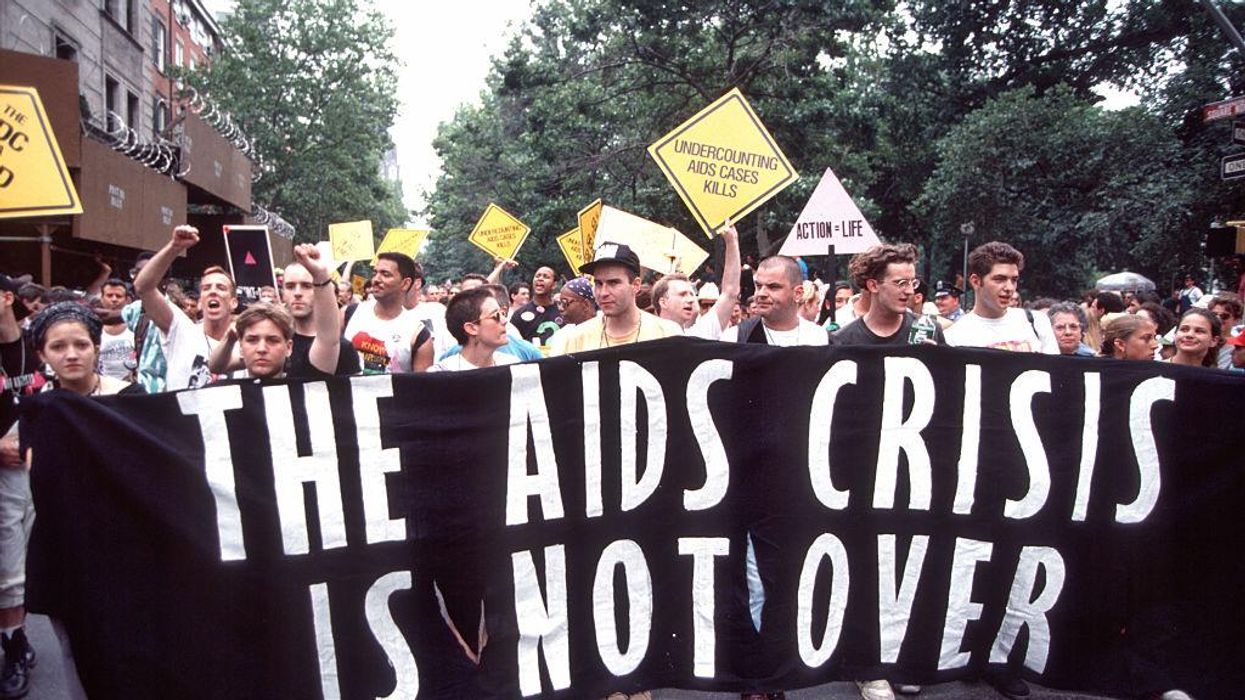
Photo by Allan Tannenbaum/Getty Images

In 1983, at the height of the AIDS epidemic, the Food and Drug Administration instituted a lifetime ban on homosexuals who had engaged in gay sex since 1977. According to a new report in the Wall Street Journal, the FDA may soon allow certain homosexuals to share their vital fluids.
People said to be familiar with the FDA's plans told the Wall Street Journal that homosexuals in monogamous relationships will soon be allowed to donate blood without having to abstain from sex. The new rules and guidance, which have yet to be finalized, will reportedly be issued sometime in the coming months.
The FDA's forthcoming decision to turn the spigot on a new source of blood reportedly comes after an agency-funded study of approximately 1,600 sexually active homosexuals was launched to "determine if a blood donor history questionnaire based on individual risk would be an acceptable alternative to a time-based deferral in reducing the risk of HIV among gay and bisexual men who present to donate blood."
Although the study conducted by the FDA and three of the largest nonprofit blood centers in the U.S. has not been resolved, it has, according to Brian Custer, director of the Vitalant Research Institute, generated "highly relevant information to envision what an individual risk-based approach would look like.”
All donors, irrespective of their disproportionate likelihood to carry HIV, will have to complete a comparable individualized risk assessment.
An FDA official indicated that the questionnaire, still being drafted, will ask prospective blood donors if they have had any new sexual partners in the past three months. Those who answer in the negative will be able to donate blood.
Those who indicate they have been promiscuous will be prompted to answer to whether they have had anal sex.
According to the Centers for Disease Control and Prevention, "anal sex is the riskiest type of sex for getting or transmitting HIV." Although both participants involved in this particular act of sodomy are at risk, the recipient is at greater risk.
The CDC also noted that normal sex "is less risky for getting HIV than receptive anal sex."
Those who answer in the negative about having anal sex will be able to donate blood. Those who answered in the affirmative will simply have to wait three months before donating blood.
The significance of the three-month window is that an HIV infection would reportedly become apparent in that time.
The Wall Street Journal noted that the FDA's likely new change won't necessarily come without risks.
While HIV testing has improved over the years — enabling blood banks to toss out bad blood taken from people long-infected — no available test can presently detect HIV immediately after infection.
Dr. Bruce Walker, an infectious-diseases specialist, told the Wall Street Journal that "with the latest HIV tests, that window is probably no greater than 10 days from the time of exposure."
The CDC noted that antibody tests, which look for antibodies to HIV in a person's blood or oral fluid, can take 23 to 90 days to detect HIV after exposure.
Antigen/body tests, which look for both HIV antibodies and antigens, can take anywhere from 18 to 90 days after exposure.
Nucleic acid tests (NATs), which look for the actual virus in the blood, "can usually detect HIV 10 to 33 days after exposure." Although highly sensitive, there have been incidents documented where NATs have failed to detect infected blood.
Gay activist groups such as the Human Rights Campaign have long suggested that the policy prohibiting homosexuals from donating blood was discriminatory, even if it prevented healthy homosexuals from receiving bad blood.
Sarah Warbelow, legal director for the Human Rights Campaign, said, "It is a completely outdated policy that doesn't reflect our current ability to test blood for HIV or the medical science around HIV."
When the initial blood ban was first instituted, the purpose was not to discriminate but to save lives.
Marguerita Lightfoot, director of the Center for AIDS Prevention Studies, told Men's Health that in the early 1980s, "We were still trying to figure out the transmission of the virus, and all we knew was that this population was disproportionately impacted."
That remains the case today.
According to the Kaiser Family Foundation, as of 2018, 13,000 people die from AIDS in the U.S. every year, and over 700,000 have died nationwide since the beginning of the HIV epidemic. AIDS is the late stage of HIV infection.
Like the recent rash of monkeypox cases, homosexuals were disproportionately impacted by the spread of the disease.
According to the CDC, in 2019, homosexuals made up nearly 70% of all new HIV diagnoses in the U.S.
Notwithstanding the higher incidence of HIV infections in the demographic, in 2015, the FDA lifted its lifetime ban on homosexuals donating blood, "changing its recommendation that men who have sex with men (MSM) be indefinitely deferred ... to 12 months since the last sexual contact with another man."
Despite its apparent significance, this change was met by derision from gay activists.
The LGBT activist organization GLAAD posted a video of script-reader Alan Cumming to YouTube, wherein he mocked the idea that gay men could abstain from sex for an entire year.
Kelsey Louie, the former CEO of the AIDS service organization Gay Men's Health Crisis, lauded the 2015 decision, saying, "The United States government has to stop reacting to HIV like it is the early 1980s. ... It is time for the FDA to implement a policy that is truly based on science, not blanket bans on certain groups of people."
That 12-month waiting time will likely soon be cut down to 3 months and only apply to non-monogamous homosexual donors.